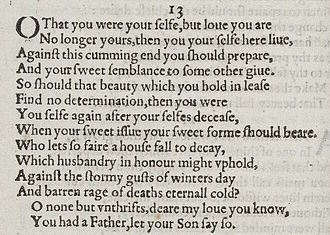
Back سونيت 13 Arabic Soneto 13 Spanish Sonnet 13 French Sonet 13 (William Szekspir) Polish Soneto 13 Portuguese Сонет 13 Russian
| Sonnet 13 | |||||||
|---|---|---|---|---|---|---|---|
 Sonnet 13 in the 1609 Quarto | |||||||
| |||||||
Sonnet 13 is one of 154 sonnets written by the English playwright and poet William Shakespeare. It is a procreation sonnet within the Fair Youth sequence.
In the sonnet, the speaker declares his admiration and love for the beauty of youth, but warns this figure of youth that he will lose it if he doesn't revitalize himself through offspring. The primary arguments made in this procreation sonnet are the maintenance of self-identity and duty to one's own heritage. His tone throughout the sonnet is intimate, highlighting the theme of affection for youth that is prevalent in the first seventeen sonnets.
- ^ Pooler, C[harles] Knox, ed. (1918). The Works of Shakespeare: Sonnets. The Arden Shakespeare [1st series]. London: Methuen & Company. OCLC 4770201.